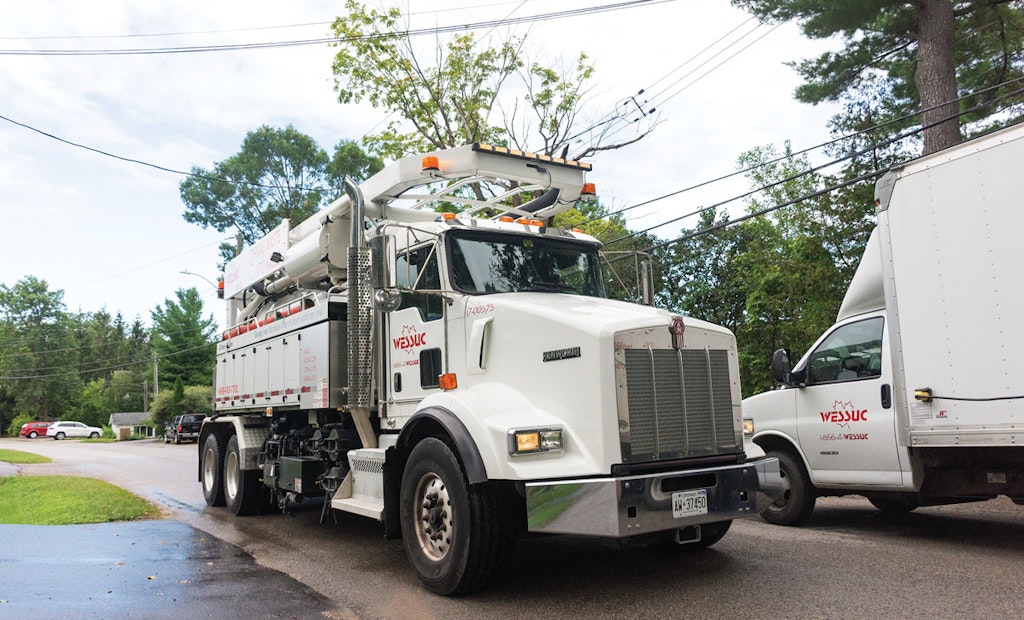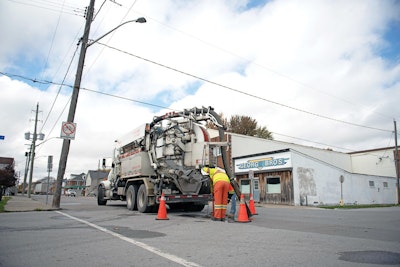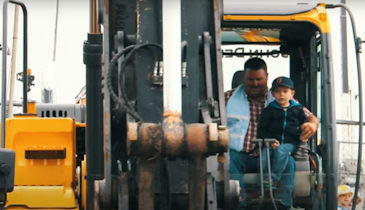
The RECycler 315 vacuum trucks from Bucher Municipal help Wessuc, a Brantford, Ontario-based environmental services company, save about 7,925 gallons of water on an average sewer-cleaning job.
Interested in Trucks?
Get Trucks articles, news and videos right in your inbox! Sign up now.
Trucks + Get AlertsTyler Loveday, a project manager at Wessuc, can sum up the benefit of investing in RECycler 315 vacuum trucks in just 10 words: Less time refilling water tanks and more time cleaning sewers.
Used primarily for municipal and commercial sewer cleaning, the water-recycling trucks from Bucher Municipal help the Brantford, Ontario-based environmental services company save about 7,925 gallons of water on an average sewer-cleaning job that would require approximately six to seven refill trips a day for a conventional vacuum truck.
“On most jobs, we can get by on just one tank of water,” says Loveday, noting the trucks feature roughly 1,300-gallon water tanks. That translates into lower water costs for customers, which enable the company to be more competitive on bidding for jobs.
Furthermore, jobs become more profitable, thanks to significantly greater productivity — up to about 3,500 to 5,000 feet of sewer cleaning a day, compared to about 2,500 to 3,000 feet per day with a conventional vac truck, he says.
“Plus there’s less traffic disruption because we can set up a truck at a location just once, instead of multiple times,” he adds. “And when we’re working on remote locations, we don’t usually have to worry about water sources.”
The company tested two of its three RECyclers from mid-June through mid-November in 2018. The trucks cleaned sewer lines for 100 days for the city of Winnipeg in the province of Manitoba, averaging 11-hour days.
Wessuc saved the city $211,134 in water costs. In addition, the trucks added only 475,473 gallons of water back into the city’s wastewater treatment system while recycling just more than 12 million gallons of water, the study showed.
Built for productivity
Wessuc bought the three RECyclers in 2018 at a cost of about $500,000 each (or roughly $700,000 in Canadian dollars, depending on currency-exchange rates). Each truck was built out on a Kenworth T880 chassis and features a 15.7-cubic-yard debris tank, a VacuStar liquid-ring vacuum pump made by CVS Engineering GmbH (1,824 cfm) and a URACA P3-45 triplex water pump (80 gpm at 2,400 psi).
The truck also features a 180-degreee articulating reel that holds 656 feet of 1 1/4-inch-diameter hose for cleaning larger pipes. A small reel carries an additional 164 feet of 1/2-inch hose for smaller pipes and washdown work, Loveday says.
For removing debris, the truck relies on a 66-foot-long, 6-inch-diameter hose that stores atop the truck and can drop down 34 feet for cleaning. The hose eliminates the time-consuming job of attaching sections of tubes to increase the vacuum-hose length.
“It’s an added value to not have to add extra tubes,” Loveday says. “It’s more efficient and puts less strain on the operator.”
Here’s how the fully continuous water-recycling system works: As the truck vacuums up debris, the system separates wastewater from the sludge, then cleans it with a five-stage filtering process that includes nine cyclone bags. A movable partition in the debris tank keeps sludge separated from the recycled water; it also gives the operator the flexibility to gain or reduce space for either water or sludge as needed.
Furthermore, the vacuum pump automatically shuts down when there’s enough vacuum in the tank, which reduces fuel consumption — sometimes up to 20%.
Two of the trucks also feature winterization packages with heated compartments and components. In addition, the trucks are significantly quieter than standard vacuum trucks, which translates into less disruption when the company works in residential neighborhoods, Loveday explains.
Generally speaking, the 315s have been durable and reliable. “They are the workhorses of our fleet. We can rely on these trucks to complete all of our jobs.”
Efficient and eco-friendly
As an environmental services company that also handles waste disposal in the industrial and agricultural sectors, the Bucher water-recycling trucks help from a marketing standpoint by underscoring the company’s commitment to the environment, Loveday says.
“The reduced environmental footprint and the water we save each day were big considerations for us. The less impact we have on the environment, in terms of water usage, the better. It’s a company value that we stand by.
“And at the same time, these trucks allow us to provide customers with cost-effective and efficient service by not wasting time and labor with water-tank refills,” he adds. “The bottom line is we now can do more work in a day and in a year.
“These trucks have been a very good investment for our company.”






